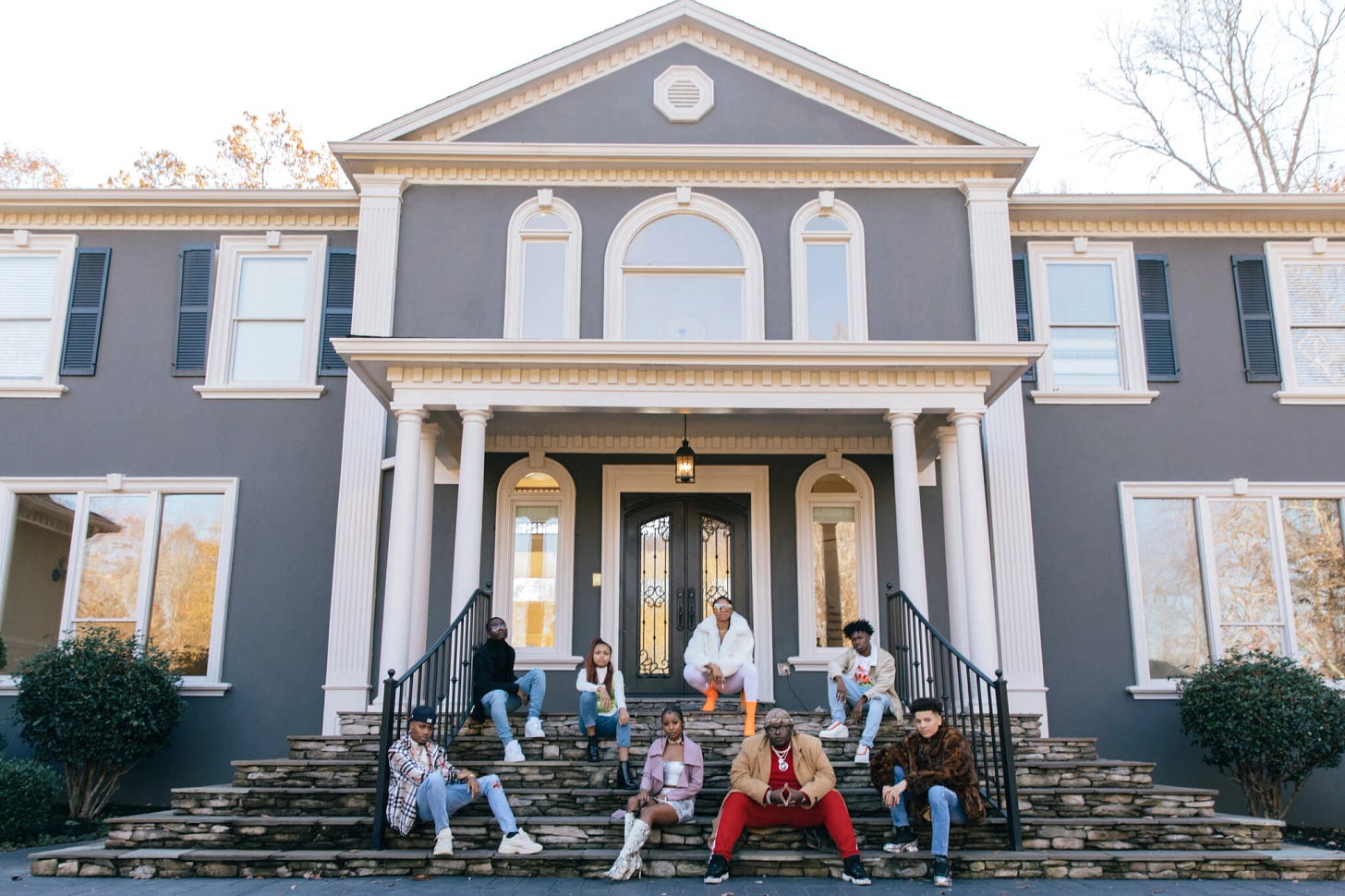Supercreator Daily: The NYT’s new documentary on Black creators explains white supremacy in a nutshell
“I’m afraid to have to go home and tell them I didn’t make it.” Plus: The seasonal cookie that took me out of my comfort zone.
Last Friday, FX Networks and Hulu premiered The New York Times: Who Gets to Be an Influencer? which chronicled the rise of the Collab Crib, an all-Black creator mansion in Atlanta as they attempt to level-up their followers and sponsors in 90 days. Here are some quick takeaways I jotted down while I watched:
I was immediately struck by how savvy the creators — Tracy Billingsley II, Theo Wisseh, Khamyra Sykes, Kaelyn Kastle, Kaychelle Dabney, Robert Dean III, Oneil Rowe and Noah Webster — and their contemporaries are. They all have a grasp of the business side of creativity that I didn’t even know was possible when I was in my early 20s.
It’s also obvious that many of the creators view social apps as a stepping stone to traditional careers in acting, screenwriting and finance. Again, super savvy considering the volatility of these apps. “This is more than just kids making videos on the internet,” Kaylyn said during the documentary. “This is the new American dream. It’s one of the best ways to make it big right now.”
At under 40 minutes, I wished it would have been longer. The previous installment of The New York Times Presents on Britney Spears was nearly 75 minutes.
As a Black creator, it was dope for the private conversations so many of have with ourselves and us each other receive a public platform.
“I’m afraid to fail. I’m afraid to be a one-hit wonder,” Kaychelle says in once scene. “I came out here on faith and I’m afraid to have to go home and tell them I didn’t make it.” This anxiety is common among marginalized communities who don’t enjoy the privilege to fail. Often when a white man’s business fails, the business is viewed as a failure. When Black, queer or women creators fail, they’re viewed as failures and often ill-afforded another comparable opportunity in the future. This reality weighs on us.
Another poignant moment: The discussion about white supremacy, racism and police brutality between Kaelyn, Kaychelle and Noah, a biracial creator who seems to believe in that he can bootstrap himself to economic and racial equity. ““You sound like every white person ever. ‘Oh, I acknowledge that people are being brutally shot,” Kaelyn said to Noah. “I acknowledge this, I acknowledge that, but it does not affect me. So I can keep acknowledging it, and I’ma just keep working hard, right?” Miss Thing said what I was thinking.
If you watch the program, you’ll notice the Collab Crib was unfurnished during filming. “We spoke to one company about furnishing our house and we were declined and they said that, ‘Hey, you guys don’t match our demographic at the moment,’” Keith Dorsey, the 32-year-old chief executive of Young Guns Entertainment, an Atlanta talent management firm, who conceived the Collab Crib, said. “And I was like, ‘What does that even mean?’ I’m like shocked every time ‘cause their numbers are hot and they actually produce really dope content, you know? What are they doing wrong?”
This explains white supremacy in a nutshell. It compels Black people to question why our exceptionalism is insufficient while legimitizing white mediocrity at our expense. And until this changes, the creator economy will be as inequitable as all of its previous incarnations.
Politics
The post-pandemic economic boom experts are predicting may be the last opportunity for millennials to build wealth before retirement. Thanks to student debt and multiple recessions, the oldest members of the generation — who turn 40 this year — are only 80 percent as wealthy as their parents were at this age.
A new COVID-19 vaccine could be available this summer that contains the spike protein and a substance to enhance the immune system’s response and make it even more protective. The current vaccines contain genetic instructions for the spike protein and require our bodies to make the protein itself to be effective.
Related: According to a new study, the “Alpha” coronavirus variant became so powerful because it hides from the human immune system, which gives it more time to multiply. Alpha was first identified in Britain.
The House Judiciary Committee sent a letter to Spotify CEO Daniel Ek requesting more information on the company’s Discovery Mode feature. Democrats are concerned the program, which lets artists and labels agree to take a lower royalty rate on certain tracks in exchange for higher priority in its algorithms, could lead to lower pay for artists and fewer choices for consumers.
In case you missed it: Facebook will no longer shield politicians from the content moderation rules that apply to other users. The company also Donald T**** would be banned until 2023.
New polling by Paid Leave for All Action found that battleground voters from both parties support paid leave and want it passed as a jobs and infrastructure priority. President Joe Biden’s American Families Plan proposes 12 weeks of paid family and medical leave through a new federally funded program.
The New York Senate advanced a bill that would give adult sexual abuse survivors a one-year “lookback” window to file lawsuits even if statutes of limitations have expired. The bill must now be passed by the state Assembly before June 10 and then signed by Governor Andrew Cuomo.
A new Maryland law will protect low-income families from overpriced electricity and gas, joining New York, Illinois, Connecticut and Ohio in reining in abuses by competitive energy suppliers. Further reading: Progressives want to socialize your electricity.
Creativity
Facebook CEO Mark Zuckerberg announced it would keep paid online events, fan subscriptions, badges and its upcoming independent news products free through 2023. He added that Facebook’s share would be less than Apple’s controversial 30-percent cut in an attempt to position it as a pro-creator company despite a business model that runs targeted ads against free creative content.
Related: Zuckerberg also revealed a new interface for creators that shows how different fees and taxes affect their earnings on Facebook’s family of apps. The timing of the announcement was petty AF: Two hours before Apple’s Worldwide Developers Conference.
Apple employees wrote a letter to CEO Tim Cook pushing back against a new policy that would require them to return to the office three days a week starting in early September. Workers say they want a flexible approach where those who want to work remotely can do so.
Twitter’s new Super Follows feature will be limited to users with at least 10,000 followers who have posted at least 25 tweets within the past 30 days and are at least 18 years old. The feature will enable fans to subscribe to Twitter profiles for bonus content and exclusive tweets.
YouTube announced its Shorts product will enable users can sample sounds from any content uploaded to the video app — and receiving mixed reviews from creators in the process. Shorts is YouTube’s TikTok competitor.
Pinterest introduced a new Shopping List featured aimed at turning saved Pins into purchases. It includes an item’s price, reviews and shipping info in an even grid so users can compare products and make buying decisions.
TikTok introduced a new section to its privacy policy that says the social video app “may collect biometric identifiers and biometric information” — like faceprints and voiceprints — from its users’ content. The policy also notes this part of the data collection is for enabling “special video effects, for content moderation, for demographic classification, for content and ad recommendations, and for other non-personally-identifying operations.
In case you missed it: The Supercreator Interview
For Sunday’s issue of Supercreator Select, I caught up with Brittany B., founder of the lifestyle blog A Little Britt of Fun. During our conversation, Brittany shared how she developed her popular “On Being” series, why she’s satisfied with working a corporate day job in an era where we’re pressured to monetize all aspects of ourselves and the next book on her impressive reading list.
Subscribe to read the full interview and you’ll get this week’s Select sent straight to your inbox. In addition to weekly interviews, Supercreator Select features my Ask Michael Q&A column plus a breakdown of the stories I’ll be covering in the upcoming week so you can focus your attention on the stories that matter to you and your creativity.
Stay tuned for a sneak peek at the next Supercreator interview in Thursday’s newsletter. 👀
Read All About It
Anna Russell at The New Yorker on the age of reopening anxiety:
Thoughts about resuming in-person socializing post-vaccination tend to induce fears of social mortification in people. “They often have images in their mind of, say, sitting around the table and feeling uncomfortable and thinking, Do I fit in? What should I talk about? What if people ask me what I’ve been doing? I haven’t really been doing anything much for the last year,” Beck told me. She has her patients try to predict what kinds of thoughts will get in the way of making and, crucially, keeping engagements. “Basically, people are afraid that they’ll be criticized, either out loud, or that people will be silently critical of them,” she said. She has them imagine the worst-case scenario and make a plan for it. “If the worst thing I’m afraid of happening is that my cousin is going to say to me, ‘Gee, it doesn’t sound like you’ve really done much at all this year,’ how could I respond to that?” she said.
Matthew Schneier at The Cut on the return of FOMO:
But the new normal is now inexorably giving way to the old normal with an onrush of vertigo, the terrestrial bends. “I had been happy in my little world,” one friend told me. “Now I’m like, Is my world tiny?” FOMO is budding again with the promise of shared experiences, the requisite burden of braving the lines for Alice Neel at the Met to talk about it afterward, Romy Schneider and Alain Delon splashing in La Piscine at Film Forum, if you can snag a ticket. (Even the lines, the snagging: a pleasure.) But it’s a FOMO that has caught us with our defenses down, less sure of what we want or the certainties that supported us going into, or going through, the last drudging months. Do I really want to go back to the old way? Will I be able to continue all the practices I developed in the pandemic era? Does everyone want to do something I now realize I don’t want to do? Do I actually want to do something I didn’t think I wanted to do?
Ronald Brownstein at The Atlantic on what’s happening in red states:
It’s not just voting rights.
Though this year’s proliferation of bills restricting ballot access in red states has commanded national attention, it represents just one stream in a torrent of conservative legislation poised to remake the country. GOP-controlled states—including Florida, Tennessee, Georgia, Texas, Arizona, Iowa, and Montana—have advanced their most conservative agenda in years, and one that reflects Donald Trump’s present stamp on the Republican Party.
Across these states and others, Republican legislators and governors have operated as if they were programming a prime-time lineup at Fox News. They have focused far less on the small-government, limited-spending, and anti-tax policies that once defined the GOP than on an array of hot-button social issues, such as abortion, guns, and limits on public protest, that reflect the cultural and racial priorities of Trump’s base.
Emily Stewart at Vox on the ugly truth behind credit card rewards:
About seven in 10 Americans have at least one credit card, and many people have multiple credit cards. The vast majority of credit card spending takes placeon rewards credit cards, and over the years, rewards have become more elaborate as companies try to compete — more cash back, more perks, more miles and hotel rooms. “In some ways, the last few years have been the golden age of credit card rewards,” Rossman said.
With more credit cards and more rewards come more swipe fees. And merchants don’t want to pay those fees out of their own pockets — so they pass some of them on in prices that everybody pays, not just the credit card holders. People paying with cash or debit cards wind up footing the bill to pay for the rewards of people who pay with credit cards — people who tend to be more well-off.
“You have this phenomenon at the point of sale, which is consumers who use credit cards — and rewards cards more specifically — tend to be cross-subsidized by consumers who use cash or debit cards,” said Joanna Stavins, senior economist and policy adviser at the Federal Reserve Bank of Boston, who has studied the issue extensively. “It’s specific to what you pull out of your wallet. It just so happens that payment instrument use is correlated with income pretty strongly, so higher-income consumers are more likely to hold a credit card in their wallet.”
Brian Riedl at The Daily Beast on the bipartisan way to save $1 trillion:
Upwards of $1 trillion can be saved over the decade (and significantly more after) from reducing upper-income benefits. We can begin with Social Security and Medicare benefits for wealthy seniors. While many surely struggle financially, today’s seniors are, overall, the wealthiest cohort in the wealthiest country in its wealthiest era. Average household retiree income grew more than twice as fast as working age-salaries between 1979 and 2016 (the latest dataavailable). And the wealthiest 10 percent of seniors are doing remarkably well. Four million retiree households hold more than $1 million in investable assets, including 1.1 million households that hold more than $3.5 million. Relatedly, CBO data show that 6.3 million elderly Americans live in households that currently earn annual market incomes (i.e., excluding Social Security and other government benefits) of at least $87,200/$123,400 (for a one- or two-person household)—including 2 million seniors in households earning more than $174,100/$246,200 annually. To the extent that such high post-retirement incomes derive from annuities or 401(k)-style investments, they suggest investment portfolios that are well into the millions of dollars.
Eric J. Lyman at Fortune on how Le Creuset went from French kitchen staple to global hit:
Le Creuset (pronounced “Leh Crew-ZAY”) isn’t as French as it used to be. The company was acquired in 1988 by South African businessman and naturalized Brit Paul Van Zuydam, and its administrative headquarters are in Switzerland. Van Zuydam told Fortune that when he bought Le Creuset, the French market made up about half its sales; now it accounts for around 3%, thanks to growth in other markets.
But the company’s heart remains in Fresnoy-le-Grand, a town of 3,000 in France’s northeastern corner, where it was founded by two Belgians 96 years ago. In the 1920s, Fresnoy-le-Grand was at a crossroads of major shipping routes for iron, coke, and sand—essential ingredients for making cast iron. Though some of Le Creuset’s products are made elsewhere, all of its cast-iron products are still made at the original location, which has recently undergone a $215 million modernization to expand capacity and improve the sustainability of the facility, which can produce more than 25,000 pieces per day.
[…]
Le Creuset’s products are not cheap. In the U.S. market, Le Creuset’s casserole dishes—they are also called French ovens, Dutch ovens, and cocottes—range from $160 to $570 depending on size. It’s no surprise the terms “sale” and “outlet” are among the most popular Internet search terms following the words “Le Creuset.” But those who use them swear by them.
“I’m not a great cook, but sometimes I feel like one when I prepare a meal with my Le Creuset cookware,” Giulia Crivelli, fashion editor at Il Sole/24 Ore, Italy’s main financial newspaper, told Fortune. She says she has around 20 of the company’s products in her kitchen.
“I think it’s like most things,” she said. “Make a high-quality product, make it simple and durable, easy to use and nice to look at, and people will buy it.”
Michael’s Pick
Insomnia Cookies 'N' Cream Cookie ($2): I’m a cookie purist so sampling this seasonal cookie was out of my comfort zone — but I’m glad I did. Just don’t tell Levain Bakery.
Thanks for reading! I appreciate you for sharing part of your day with The Supercreator. See you tomorrow. —Michael





